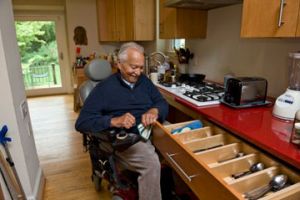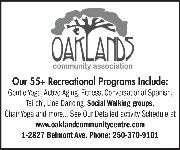
Grey Matters Blog
The Six Essential Activities of Daily Living
by Guest Author
Category: Articles, Information & Tips, Guest Articles on Mature Adult Issues
Did you know that there are many extra benefits when a senior involves in an exercise? As a person ages, the ability to perform 'instrumental activities of daily living' (ADLs) diminish. These activities are important for independent living. They include using the telephone, preparing meals, shopping and handling finances.
There are six basic ADLs which are often used to assess whether the senior is able to live at home independently – or 'age in place'.
These are:
1. Transferring (moving a person in or out of a chair, bed or wheelchair
2. Ambulation (walking or moving from point A to B in a safe and balanced manner
3. Toileting & Continence (getting to and from the toilet, getting on and off the toilet, controlling bowel or bladder function, and performing associated personal hygiene
4. Dressing (being able to put on and remove articles of clothing, and any needed braces, orthotics, fasteners or artificial limbs
5. Eating (the process of putting food into the body from receptacle such as a cup or plate, by means of a feeding tube, and intravenously
6. Bathing (the ability to consistently perform personal care such as washing, showering, bathing, dental care, hair care, hand and foot care, and nail care
If a senior cannot perform these activities, they'll usually require some home support.
Transferring
When the senior experiences difficulty with these activities it is highly likely they are lacking the functional strength of their arms and legs to push off from a sitting or reclining position. A balanced exercise program incorporating strength exercises for biceps, triceps, and quadriceps will assist in keeping your senior moving.
Ambulating
You've probably seen seniors with balance issues. Balance is often severely compromised for a person with back, knee or hip pain. In addition, seniors with dementia find their movement further compromised due to both slowness and uneven gait patterns.
Toileting and Continence
If your senior is no longer able to perform this function, their dignity is severely compromised. Care workers are usually engaged at this point to assist with home support and a care aid can assist your senior in purchasing the necessary personal hygiene products.
Dressing
Often seniors with arthritic hands or debilitating back pain will have trouble putting on articles of clothing or using zippers and buttons. A program incorporating flexibility exercises and stretching will be useful.
Eating
Seniors need fewer calories as they age. As a result, they need to eat more wisely to make sure they have sufficient nutrients. Unfortunately, most studies show that most seniors are not getting the nutrients they need. A care worker can help with with planning menus, cooking food that's more nutritious, or purchasing frozen meals that have maximum nutritional value.
Bathing
A lot of seniors – especially those with dementia – do not want to bathe as often as they should. Often, it can be because they're scared of falling. Or they think they've bathed recently when it was actually two weeks ago. Additionally, they may forget how to wash themselves. Or they may shampoo their hair but not rinse the shampoo out, causing scalp problems. Unfortunately, not bathing enough can result in infections and potentially hospital stays. Home care workers can set up a schedule and make sure the senior is clean.
We often take these basic activities for granted. However, they're very important to ensure a senior stays independent as long as possible. The goal is to arrange care to help seniors 'age in place' for as long as possible and enjoy their independence and freedom.





